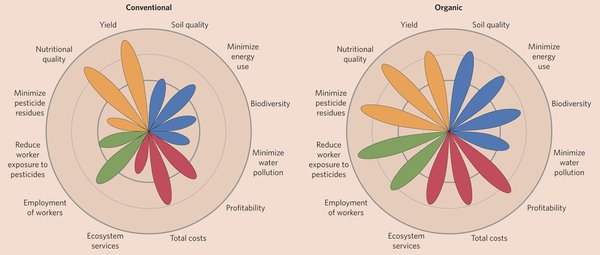American scientists: Organic agriculture can be the key to feeding the world
After reviewing 40 years of data, two Washington State University scientists have concluded that it is possible feeding a growing global population having sustainability goals in mind.

Critics have long argued that organic agriculture is inefficient, requiring more land to yield the same amount of food.
The review paper “Organic Agriculture in the 21st Century” describes cases in which organic yields can be higher than conventional farming methods.
Organic agriculture is more profitable for farmers
In the comprehensive paper, hundreds of published studies from the last 40 years provide evidence that organic farming can produce sufficient yields, be profitable for farmers, protect and improve the environment and be safer for farm workers than conventional agriculture. 
The study, published in the Proceedings of the National Academy of Sciences, was authored by Washington State University scientists John P. Reganold and Jonathan M. Wachter.
Organic systems better balance the areas of sustainability
It is the first study to analyse 40 years of science comparing organic and conventional agriculture across the four goals of sustainability identified by the National Academy of Sciences:
productivity, impact on the environment, economic viability and social well-being.
An assessment of organic farming relative to conventional farming illustrates that organic systems better balance the four areas of sustainability.
Lengths of the 12 flower petals are qualitatively based on the studies discussed in the paper. The petals indicate the level of performance of specific sustainability metrics relative to the four circles representing 25, 50, 75 and 100%.
Less pollution, lower greenhouse gas emission, better soil quality and greater biodiversity
Numerous of the reviewed studies prove the environmental benefits of organic production. Organic farms tend to store more soil carbon, have better soil quality and reduce soil erosion; organic agriculture creates less soil and water pollution and lower greenhouse gas emission, and it is more energy efficient because it doesn’t rely on synthetic fertilisers or pesticides.
Last but not least, organic agriculture is also associated with greater biodiversity of plants, animals, insects and microbes as well as genetic diversity. For instance biodiversity increases the services that nature provides, like pollination.
Read the entire paper: Nature Plants, feb. 2016: Organic Agriculture in the 21st century
Contacts
John Reganold, WSU Department of Crop and Soil Sciences, reganold@wsu.edu
Jonathan Wachter, WSU Department of Crop and Soil Sciences, jonathan.wachter@wsu.edu
Sylvia Kantor, WSU College of Agricultural, Human and Natural Resource Sciences, kantors@wsu.edu
See TED Talk 2014: Moving agriculture into the 21st century: Dr. John Reganold at TEDxWSU 2014
“Conventional farming systems have provided increasing supplies of food and other products, but often at the expense of the other three sustainability goals. Alternative systems, such as organic and integrated farming, better blend production, environment, and socio-economic objectives. Yet, no one of these systems alone will produce enough food to feed the planet.”
